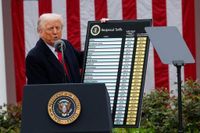On April 2, 2025, U.S. President Donald Trump took a bold step in international trade by signing an executive order that imposes sweeping retaliatory tariffs on imports from over 100 countries. Dubbed a "declaration of economic independence," the tariffs, which range from 10% to 50%, are set to affect a wide array of goods and have sent shockwaves through global markets.
Among the countries impacted, Vietnam faces the steepest tariffs at 46%, followed by China at 34% and Taiwan at 32%. This aggressive move is likely to have significant ramifications for major industries, particularly in the automotive, apparel, and footwear sectors, many of which rely heavily on manufacturing in these regions.
While Canada and Mexico have been granted exemptions from these new tariffs, provided they comply with the U.S.-Mexico-Canada trade deal, the situation remains tense. Higher tariffs on aluminum and steel continue, and all foreign auto products will soon be subject to new tariffs as well.
The announcement has drawn immediate criticism and concern from various global leaders and industries. Germany's automotive sector, for instance, has expressed its worries, stating that the tariffs would create "only losers" and urging the European Union to respond firmly. The German Chemical Industry Association (VCI), representing major companies like Bayer and BASF, emphasized the need for calm and continued dialogue with Washington. "We regret the decision of the U.S. government. It’s important for all sides to remain calm," a spokesperson stated.
U.S. Treasury Secretary Scott Bessent also weighed in on the situation, advising other nations against retaliatory measures. "Hold back, absorb the hit, wait to see how things evolve. If you retaliate, there will be escalation," he warned, highlighting the potential for further conflict in international trade relations.
In contrast, the United Kingdom is pursuing a different strategy. British Trade Secretary Jonathan Reynolds announced that the UK is seeking a deal with the U.S. to soften the impact of the tariffs, emphasizing the importance of maintaining a strong relationship with its closest ally. The UK has been relatively fortunate in this announcement, with only a 10% tariff imposed on British goods entering the U.S.
Canada, however, is preparing to take a firmer stance. Prime Minister Mark Carney declared that the country would respond with countermeasures, stating, "It’s absolutely necessary to act with purpose and strength — and that’s what we’ll do." This indicates a readiness to engage in a tit-for-tat response to protect Canadian interests.
China's response has been equally vocal, calling for the U.S. to cancel the unilateral tariffs and resolve disputes through "equal and fair dialogue." The Ministry of Commerce expressed strong dissatisfaction with the tariffs, stating, "Many trade partners have expressed strong dissatisfaction and clear opposition," and warned of "resolute countermeasures" to defend its rights and interests.
Japan has also expressed its concerns regarding the tariffs, particularly the 24% imposed on Japanese goods. Chief Cabinet Secretary Yoshimasa Hayashi articulated worries that these tariffs may violate World Trade Organization (WTO) rules as well as the bilateral trade agreement between the two nations. Earlier, Japanese Trade Minister Yoji Muto described the tariffs as "extremely regrettable" and urged Washington not to impose them.
Brazil, under President Luiz Inácio Lula da Silva, is also considering its options in response to the 10% tariffs on Brazilian exports. The government stated it is reviewing all potential actions, including bringing the matter before the WTO to defend its national interests. Brazil's parliament has already passed a law empowering the government to retaliate against trade restrictions, indicating a strong willingness to respond decisively.
The global reaction to Trump's tariffs underscores the complexities of international trade dynamics and the potential for significant fallout. As countries grapple with the implications of these tariffs, the call for dialogue and negotiation remains critical. The situation is developing, and many nations are watching closely to see how the U.S. and its trading partners will navigate this turbulent landscape.
The imposition of these tariffs marks a significant moment in global trade relations, raising questions about the future of international commerce and cooperation. As the world awaits further developments, the impact of Trump's executive order will undoubtedly reverberate across industries and economies worldwide.





